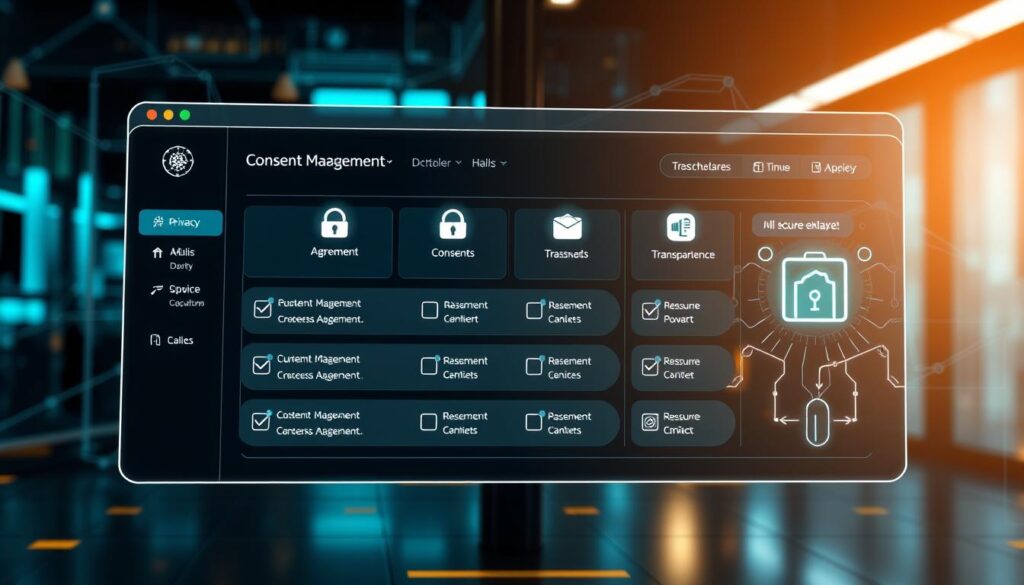The General Data Protection Regulation (GDPR) was introduced in 2018. It has changed how businesses handle personal data. This law aims to give EU, EEA, and UK residents more control over their personal info.
GDPR can fine companies up to €20,000,000 or 4% of their annual income for breaking the rules. This makes companies think differently about how they manage customer data. It affects marketing, sales, and customer service, requiring careful handling of personal info.
GDPR’s main goal is to build trust and loyalty with customers. By following key rules like data minimization and transparency, businesses can improve their customer relationships. This opens up new chances for growth.
Key Takeaways:
- GDPR sets strict rules for businesses handling personal data, affecting all sizes.
- The law aims to give EU, EEA, and UK residents more control over their personal info. It impacts marketing, sales, and customer service.
- Following GDPR means using responsible data management. This includes data minimization and transparency to build trust with customers.
- Not following GDPR can lead to big fines. So, businesses must focus on protecting data.
- Adapting to GDPR can help companies improve their customer relationships and marketing.
Understanding GDPR Fundamentals and Its Impact on Business Data
The General Data Protection Regulation (GDPR) has changed how businesses handle customer data. It’s an EU rule that affects all companies that deal with personal data of EU and EEA citizens. This rule impacts businesses a lot, especially in managing consent, protecting customer privacy, and personalizing marketing.
What Constitutes Personal Data Under GDPR?
GDPR says personal data includes things like names, email addresses, and IP addresses. It also covers biometric data. Businesses need to know what personal data they handle. This is because GDPR protects a lot of customer information.
Key GDPR Principles for Businesses
- Lawfulness, Fairness, and Transparency: Companies must have a good reason for using personal data. They also need to tell customers how they use their data clearly.
- Purpose Limitation and Data Minimization: Businesses should only use personal data for a specific reason. They should only collect what’s necessary.
- Accuracy and Storage Limitation: Companies must make sure personal data is correct. They should only keep it for as long as needed.
- Integrity and Confidentiality: Businesses must protect personal data well. They need to use strong security measures.
Enforcement and Penalties for Non-Compliance
GDPR has strict rules, with big fines for breaking them. Companies like Amazon Europe and Google have been fined a lot. To avoid big problems, businesses must follow GDPR closely.
How GDPR and Data Privacy Affect CRM and Marketing Automation
The General Data Protection Regulation (GDPR) has changed how businesses handle customer data. It requires getting clear consent before using personal data. This affects how companies nurture leads and protect data.
Marketers must now ask for permission, give access, and use only what’s needed. They can’t use pre-checked boxes or buy email lists. Businesses must explain how they use customer data clearly.
CRM systems have to handle customer requests better. Customers can ask for their data, fix mistakes, or have it deleted. Not following these rules can lead to big fines, up to €20 million or 4% of annual revenue.
To follow GDPR, companies need to check their data use, update privacy policies, and secure customer info. This builds trust and keeps them ahead in the market.

The GDPR has reshaped how businesses handle lead nurturing, marketing automation tools, and data protection. By following these rules, companies avoid fines and show they care about privacy. This builds strong, lasting relationships with customers.
Essential Changes in Marketing Data Collection and Consent Management
The General Data Protection Regulation (GDPR) has changed how we handle customer data and follow marketing rules. Now, marketers must get clear consent before using personal data. This means a big change in how we collect and manage data and consent.
Implementing Explicit Consent Mechanisms
GDPR says businesses need to get clear, direct consent from customers before using their data. This means using clear sign-up forms and double opt-in processes. Marketers must tell customers how their data will be used and make it easy for them to change their consent.
Managing Data Access and Deletion Requests
GDPR also lets people see, change, and delete their data. Marketers need to quickly handle these requests. They must have good systems in place to manage data and keep customers’ trust.
Best Practices for Email Marketing Compliance
- Include clear and prominent unsubscribe options in all marketing emails
- Respect customer preferences and honor opt-out requests in a timely manner
- Regularly review and refresh consent for existing email subscribers
- Implement double opt-in signup processes to validate consent
By following the new rules for managing customer data, businesses can stay legal and build trust. This improves their relationships with customers.

CRM Systems and GDPR Compliance Requirements
The European Union’s General Data Protection Regulation (GDPR) is changing how we handle data online. Customer relationship management (CRM) systems must now meet these new privacy standards. Companies using CRM for protecting customer data and marketing need strong features to follow these rules.
A survey by the Global Alliance of Data-Driven Marketing Associations (GDMA) and Winterberry Group found that 92% of companies store customer or prospect info in databases. This shows how crucial it is for CRM systems to adapt to GDPR’s rules. These rules include:
- Consent Management: Using clear consent for collecting and processing data.
- Subscription Management: Making it simple for customers to change their subscription settings and stop marketing emails.
- Bulk Updates: Helping to quickly update and correct personal data in the CRM.
CRM systems should also follow the “privacy by design” principle. This means data protection is a key part of the system’s design and use. It should handle personal data from start to finish, following GDPR’s eight basic rights.
Using GDPR-compliant CRM tools helps businesses manage personal data better. It makes following the rules easier and builds trust with customers.

Building Trust Through Privacy-First Marketing Strategies
In today’s digital world, trust is crucial. Businesses need to focus on privacy-first marketing. This means collecting only the data they really need. It helps build strong relationships and improves lead nurturing and marketing personalization.
Transparency in Customer Communications
Being open is essential for trust. Companies should have clear privacy policies. These policies explain how they handle customer data management.
Consent forms should be easy to understand. This lets customers know how their data is used. It makes them feel in control and part of the partnership.
Documentation and Accountability Measures
Businesses must show they care about privacy. They need to document their efforts and be accountable. This includes privacy impact assessments and data protection officers.
Keeping detailed records of data use is also important. It helps meet regulations and builds trust with customers.

Data Minimization and Purpose Limitation
Data minimization is key in privacy-first marketing. Companies should only collect what they need. This avoids collecting too much data.
They must also use data only for its intended purpose. Sharing data without consent is not allowed.
Conclusion
GDPR compliance is now key for businesses in CRM and marketing automation. It’s about keeping customer data safe and avoiding big fines. Companies must make sure their data handling meets GDPR’s strict rules.
Getting GDPR compliant might seem hard, but it’s a chance to win customer trust. It also helps improve data quality and gives a competitive edge. By focusing on consent, data access, and privacy in marketing, businesses can build stronger customer relationships.
GDPR is more than just following the law. It’s a way to gain customer loyalty and improve your brand’s image. It also helps avoid expensive penalties. By seeing GDPR as a chance for change, companies can become leaders in data privacy and security.
FAQ
What is GDPR and how does it impact businesses?
What types of personal data are covered under GDPR?
What are the key principles of GDPR?
How does GDPR affect CRM and marketing automation?
What are the key requirements for GDPR compliance in marketing?
How should CRM systems be adapted to meet GDPR requirements?
What are the benefits of GDPR compliance in CRM and marketing automation?
Source Links
- https://www.scrut.io/post/gdpr-for-marketers
- https://www.superoffice.co.uk/resources/articles/gdpr-customer-data/
- https://www.fivecrm.com/blog/gdpr-and-customer-services/
- https://martech.org/gdpr-the-general-data-protection-regulation/
- https://www.springagency.com/what-is-gdpr-and-privacy-how-does-it-affect-marketing-and-sales
- https://www.fivecrm.com/blog/gdpr-can-impact-marketing-department/
- https://www.linkedin.com/advice/3/what-implications-gdpr-crm-data-privacy-vwlvf
- https://usercentrics.com/guides/privacy-led-marketing/gdpr-and-marketing/
- https://www.superoffice.com/blog/gdpr-marketing/
- https://www.onetrust.com/blog/enhancing-marketing-automation-with-consent-data/
- https://www.superoffice.com/blog/gdpr-crm/
- https://www.clearc2.com/resources/blog/crm-best-practices/gdpr-and-crm/
- https://cdp.com/articles/what-is-first-party-data-and-why-is-it-so-important/
- https://www.techtarget.com/searchcustomerexperience/tip/Why-does-data-privacy-matter-in-marketing
- https://www.businessofapps.com/insights/app-gdpr-compliance-how-gdpr-affects-mobile-app-marketing/
- https://www.openprisetech.com/blog/marketing-ops-guide-gdpr-compliance/




